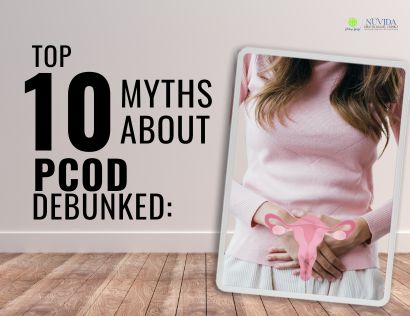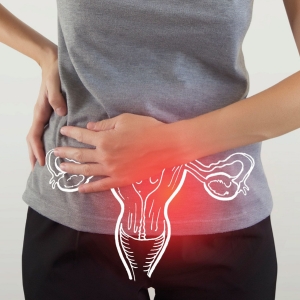
Top 10 Myths About PCOD Debunked: What You Should Know Before Starting Treatment
Polycystic Ovary Syndrome (PCOS), also known as Polycystic Ovarian Disease (PCOD), is one of the most common hormonal disorders affecting women of reproductive age. Yet, despite its prevalence, there are many misconceptions about the condition that can cause confusion and prevent women from seeking the appropriate care. Understanding PCOD in its true context is crucial for effective management and treatment.
1. Myth: PCOD Only Affects Women Who Are Overweight
This is one of the most pervasive myths about PCOD. While it’s true that being overweight or obese can exacerbate the symptoms of PCOD, the condition can affect women of any size. Many women with a healthy weight or even those who are underweight may still experience the hormonal imbalances and symptoms associated with PCOD, such as irregular periods, acne, and infertility.
Fact: PCOD can occur in women of any body type, and its root causes are primarily hormonal imbalances, rather than weight alone.
2. Myth: PCOD Always Leads to Infertility
 While it’s true that PCOD can affect ovulation, making it harder to get pregnant, it doesn’t mean that pregnancy is impossible. With the right treatment, many women with PCOD are able to have children without difficulty.
While it’s true that PCOD can affect ovulation, making it harder to get pregnant, it doesn’t mean that pregnancy is impossible. With the right treatment, many women with PCOD are able to have children without difficulty.
Fact: PCOD is one of the leading causes of infertility, but it’s usually treatable with medication, lifestyle changes, and fertility treatments like ovulation induction and IVF if necessary.
3. Myth: PCOD Is Just a Reproductive Disorder
PCOD is often considered only a reproductive issue, but it affects many aspects of a woman’s overall health. In addition to causing irregular periods and ovarian cysts, PCOD can lead to other health problems, including insulin resistance, diabetes, obesity, high cholesterol, and even heart disease.
Fact: PCOD is a metabolic disorder that impacts several parts of the body, not just the reproductive system. It’s important to monitor and manage all aspects of the condition to avoid long-term complications.
4. Myth: You Can’t Manage PCOD Without Medication
Many women believe that medication, such as birth control pills or fertility treatments, is the only way to manage PCOD. While medications can help regulate menstrual cycles, reduce symptoms, and improve fertility, they are not the only option. Lifestyle changes, including diet, exercise, and stress management, play an essential role in managing PCOD naturally.
Fact: A holistic approach that includes a balanced diet, regular physical activity, and stress reduction techniques can greatly improve PCOD symptoms. Medications are often used as part of a comprehensive treatment plan, but they are not always the first line of defense.
5. Myth: Only Women With Visible Symptoms Have PCOD
Not all women with PCOD have visible or obvious symptoms. Some women may have a mild form of the condition, which can go unnoticed until they face problems with fertility or irregular periods. Additionally, some women may not exhibit external symptoms like excess hair growth or acne, but still experience internal issues, such as hormone imbalances and insulin resistance.
Fact: PCOD can be asymptomatic, especially in the early stages. Routine check-ups and blood tests are crucial for diagnosing the condition, even in the absence of visible symptoms.
6. Myth: PCOD Will Go Away With Age
Many women mistakenly believe that PCOD will resolve itself with age. While some women do experience a reduction in symptoms as they approach menopause, PCOD is a chronic condition that needs ongoing management throughout life. Symptoms like irregular periods or difficulty getting pregnant can persist even in older women, and the risk of developing complications like type 2 diabetes remains elevated.
Fact: PCOD is a lifelong condition that requires ongoing monitoring. Age may reduce some symptoms, but it won’t eliminate the risk of complications, so managing the condition is key to long-term health.
7. Myth: Dieting Can Cure PCOD
While maintaining a healthy weight can help manage symptoms of PCOD, there is no quick-fix diet that can cure the condition. It’s important to focus on sustainable lifestyle changes, including a balanced, nutrient-rich diet that helps control insulin levels and improve hormonal balance. Fad diets are trendy, restrictive eating plans that promise quick weight loss but are often unsustainable and lacking in essential nutrients.
Fact: A well-rounded diet rich in whole foods, lean proteins, fiber, and healthy fats, combined with regular exercise, is key to managing PCOD effectively. It’s about long-term health, not just weight loss.
8. Myth: Women with PCOD Have to Avoid Carbs Entirely
A common myth is that women with PCOD must completely avoid carbohydrates. While managing insulin resistance is important for women with PCOD, it doesn’t mean that carbs should be completely eliminated. Healthy, complex carbohydrates like whole grains, fruits, and vegetables are an essential part of a balanced diet. The key is to choose low-glycemic, nutrient-dense carbs that don’t spike insulin levels.
Fact: Instead of avoiding carbs, focus on eating healthy, complex carbohydrates in moderation, which can support better blood sugar control and hormonal balance.
9. Myth: PCOD Is Just About the Ovaries
 Although the ovaries play a central role in PCOD, the condition is much broader. It involves the overproduction of androgens (male hormones), which can lead to symptoms like excessive hair growth and acne.
Although the ovaries play a central role in PCOD, the condition is much broader. It involves the overproduction of androgens (male hormones), which can lead to symptoms like excessive hair growth and acne.
Additionally, insulin resistance is a common issue in PCOD, contributing to weight gain and increasing the risk of type 2 diabetes.
Fact: PCOD is a systemic condition that affects hormone levels, metabolism, and several organs. It’s important to consider the whole body when managing the disorder, rather than focusing only on the ovaries.
10. Myth: PCOD Is Rare
PCOD is far more common than many people realize. In fact, it affects approximately 1 in 10 women of reproductive age worldwide, making it one of the most prevalent hormonal disorders in women. Despite its commonality, there remains a lack of awareness about its symptoms and treatment options, which can delay diagnosis and proper management.
Fact: PCOD is a widespread condition, affecting a significant portion of the female population. Increased awareness, early diagnosis, and proactive management are essential to minimizing the impact of PCOD on women’s lives.
11. Myth: Acupuncture is Painful and Uncomfortable
Many people believe that acupuncture is a painful experience due to the use of needles, but this is a common misconception.
Fact: In reality, acupuncture is generally not painful. The needles used are incredibly thin—often as fine as a human hair so they do not cause the sharp pain associated with traditional injections or needles. When inserted, patients usually feel a mild sensation, such as a slight prick, a tingling, or a dull ache, but it is not painful. In fact, many individuals report feeling relaxed and calm during and after an Acupuncture session. The process is designed to promote healing, reduce stress, and improve circulation, making it a soothing experience for most patients.
Polycystic Ovary Syndrome is a complex and multifaceted condition that goes far beyond just affecting a woman’s fertility. By debunking these myths, we hope to empower women with accurate information about PCOD, allowing them to make informed decisions about their health and treatment options. If you suspect you may have PCOD or have been diagnosed with it, it’s important to consult a healthcare professional who specializes in hormonal health. With early intervention, personalized treatment plans, and a holistic approach, women with PCOD can lead healthy, fulfilling lives.



Leave A Comment